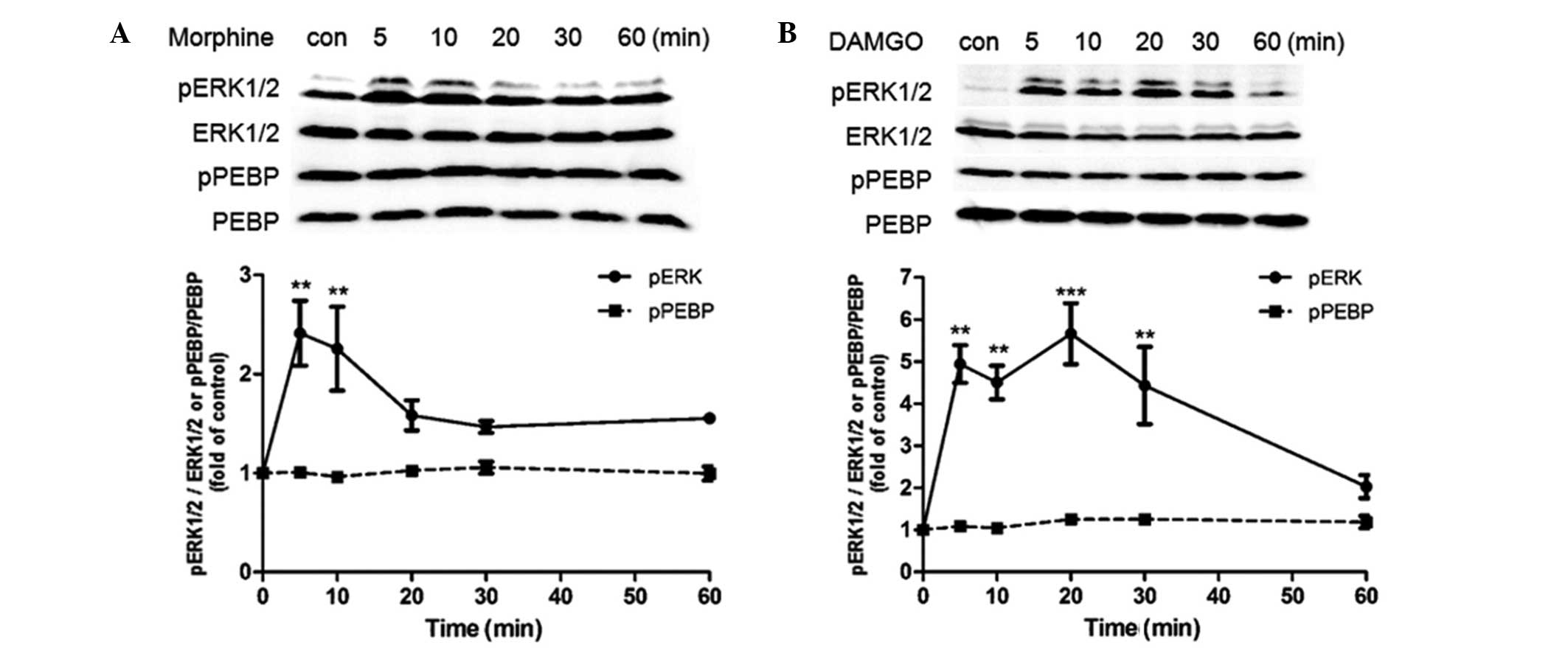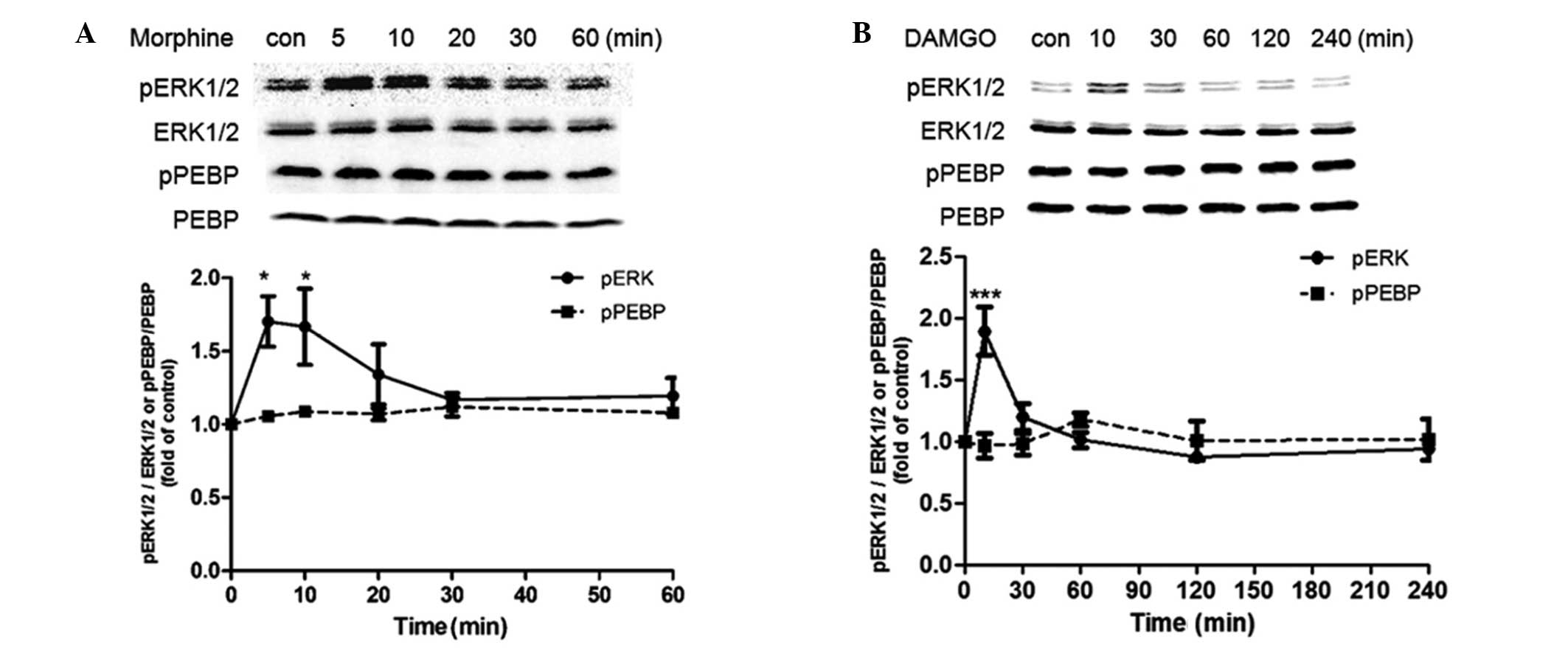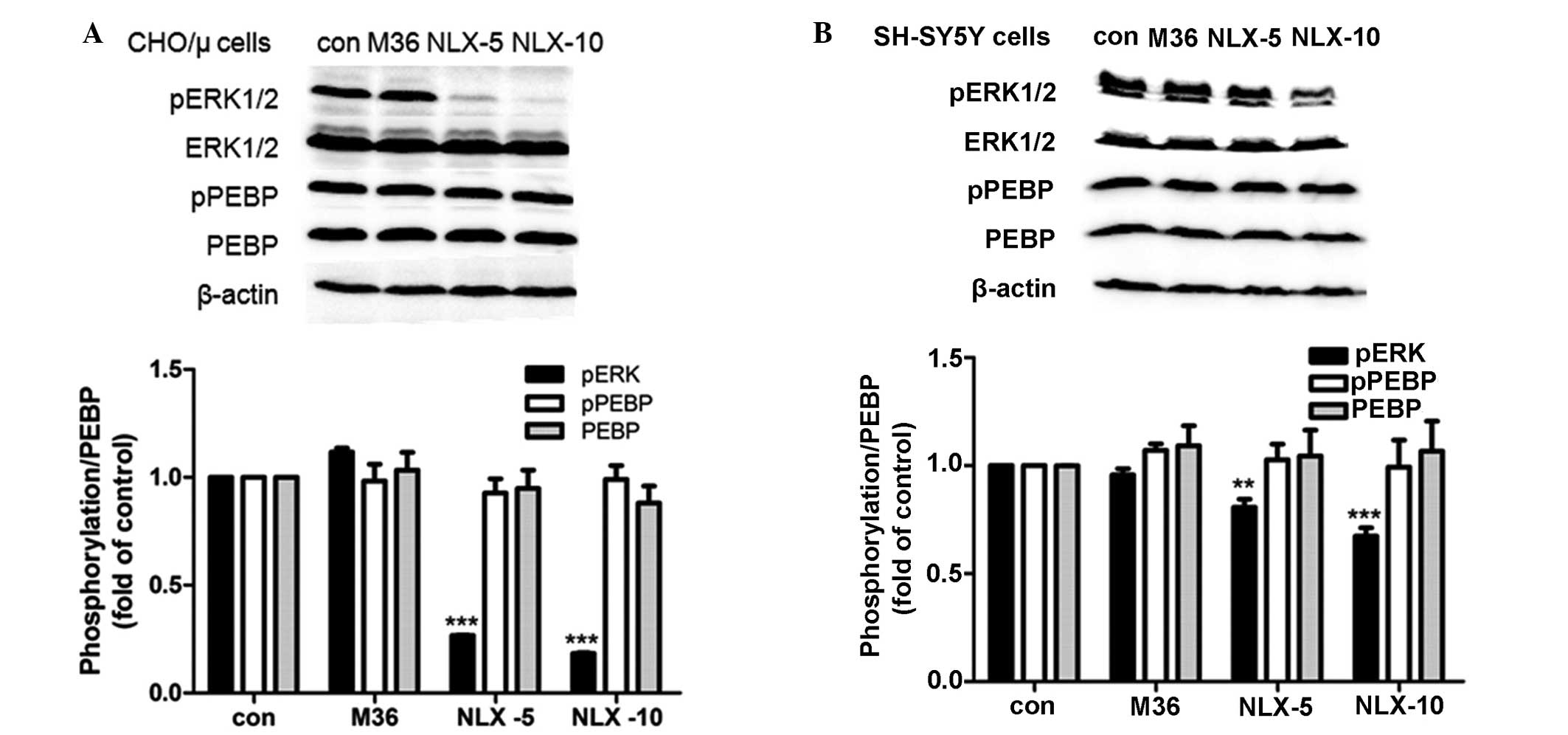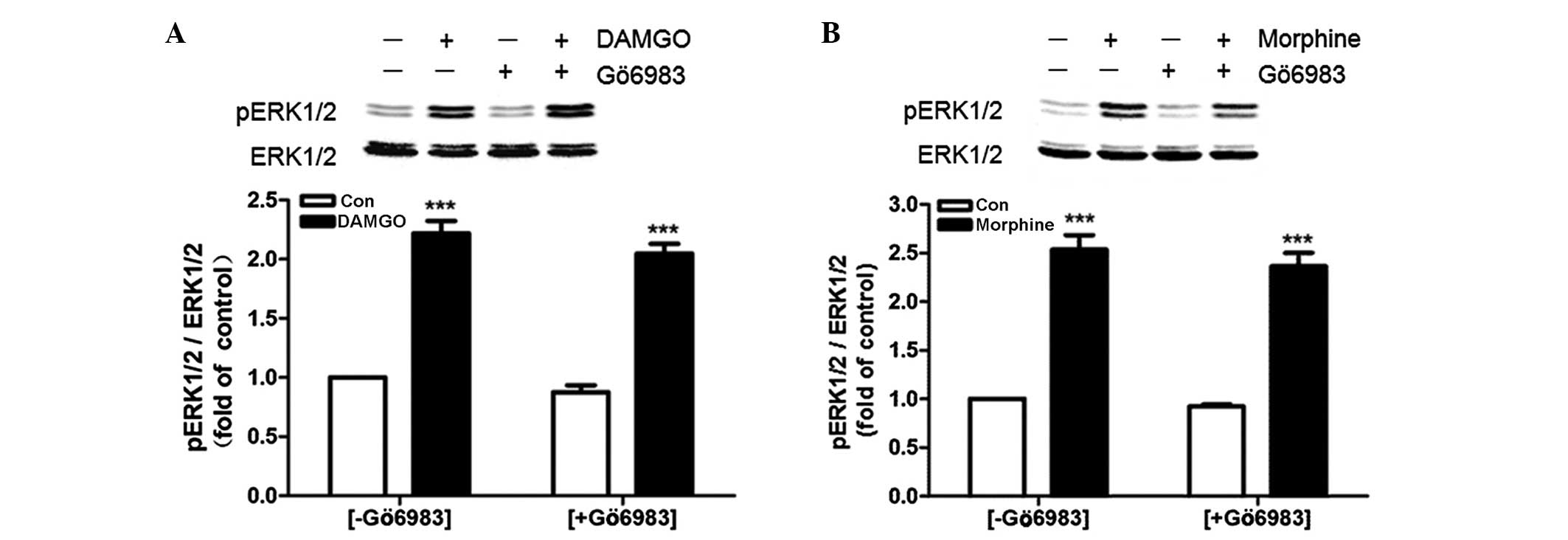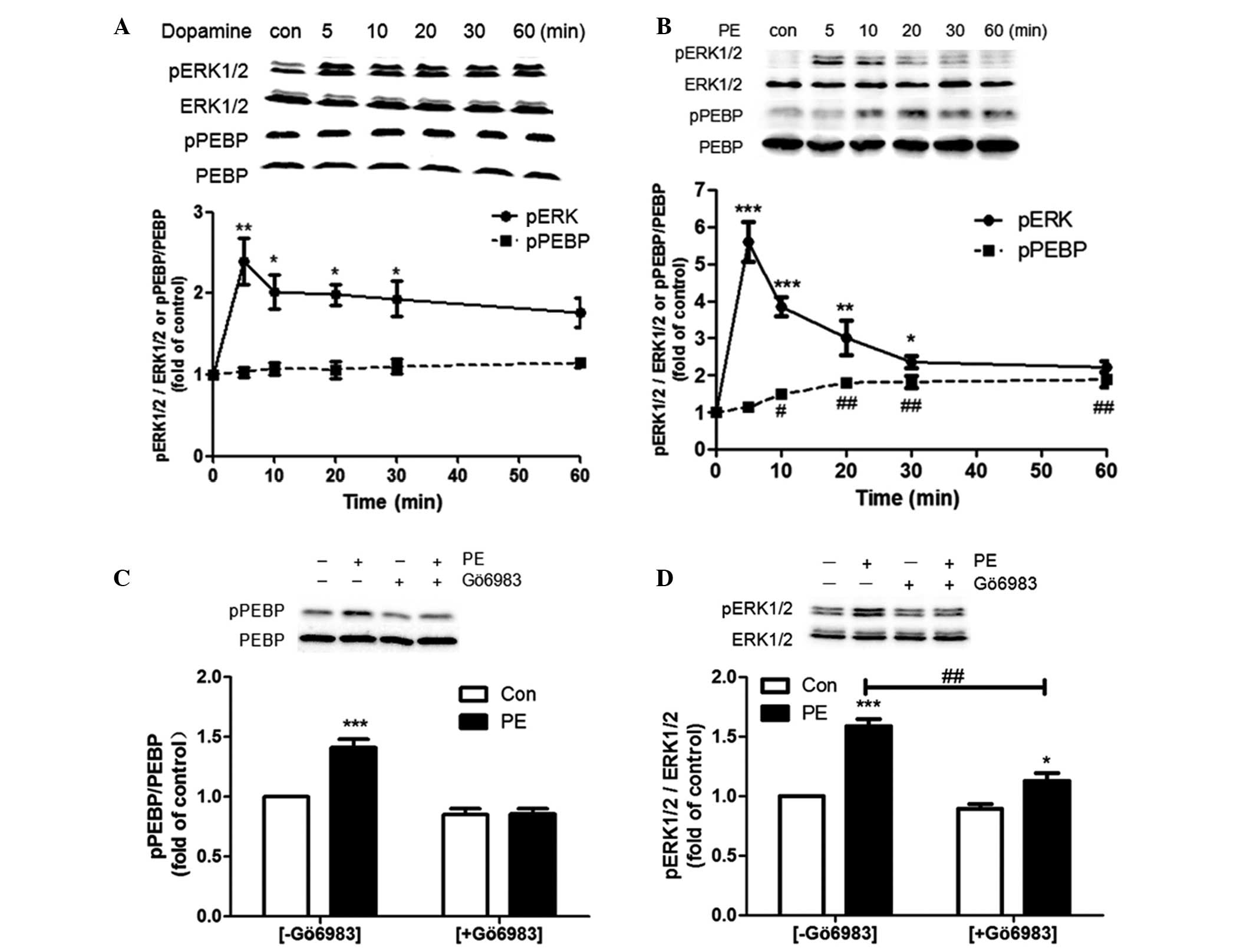|
1
|
Lefkowitz RJ: Historical review: A brief
history and personal retrospective of seven-transmembrane
receptors. Trends Pharmacol Sci. 25:413–422. 2004. View Article : Google Scholar : PubMed/NCBI
|
|
2
|
Law PY, Wong YH and Loh HH: Molecular
mechanisms and regulation of opioid receptor signaling. Annu Rev
Pharmacol Toxicol. 40:389–430. 2000. View Article : Google Scholar : PubMed/NCBI
|
|
3
|
Bailey CP and Connor M: Opioids: cellular
mechanisms of tolerance and physical dependence. Curr Opin
Pharmacol. 5:60–68. 2005. View Article : Google Scholar : PubMed/NCBI
|
|
4
|
Watts VJ: Molecular mechanisms for
heterologous sensitization of adenylate cyclase. J Pharmacol Exp
Ther. 302:1–7. 2002. View Article : Google Scholar : PubMed/NCBI
|
|
5
|
Eisinger DA and Ammer H: δ-Opioid
receptors activate ERK/MAP kinase via integrin-stimulated receptor
tyrosine kinases. Cell Signal. 20:2324–2331. 2008. View Article : Google Scholar : PubMed/NCBI
|
|
6
|
Zheng H, Loh HH and Law PY:
β-arrestin-dependent μ-opioid receptor-activated extracellular
signal-regulated kinases (ERKs) translocate to nucleus in contrast
to G protein-dependent ERK activation. Mol Pharmacol. 73:178–190.
2008. View Article : Google Scholar :
|
|
7
|
Girault A, Valjent E, Caboche J and Herve
D: ERK2: a logical and gate critical for drug-induced plasticity?
Curr Opin Pharmacol. 7:77–85. 2007. View Article : Google Scholar
|
|
8
|
Dhillon AS, von Kriegsheim A, Grindlay J
and Kolch W: Phosphatase and feedback regulation of Raf-1
signaling. Cell Cycle. 6:3–7. 2007. View Article : Google Scholar : PubMed/NCBI
|
|
9
|
Lefkowitz RJ and Shenoy SK: Transduction
of receptor signals by β-arrestins. Science. 308:512–517. 2005.
View Article : Google Scholar : PubMed/NCBI
|
|
10
|
Chong H, Vikis HG and Guan KL: Mechanisms
of regulating the Raf kinase family. Cell Signal. 15:463–469. 2003.
View Article : Google Scholar : PubMed/NCBI
|
|
11
|
Cacace AM, Ueffing M, Philipp A, et al:
PKC epsilon functions as an oncogene by enhancing activation of the
Raf kinase. Oncogene. 13:2517–2526. 1996.PubMed/NCBI
|
|
12
|
Cai H, Smola U, Wixler V, et al: Role of
diacylglycerol-regulated protein kinase C isotypes in growth factor
activation of the Raf-1 protein kinase. Mol Cell Biol. 17:732–741.
1997.PubMed/NCBI
|
|
13
|
Marais R, Light Y, Mason C, et al:
Requirement of Ras-GTP-Raf complexes for activation of Raf-1 by
protein kinase C. Science. 280:109–112. 1998. View Article : Google Scholar : PubMed/NCBI
|
|
14
|
Zheng Y, Liu H, Coughlin J, et al:
Phosphorylation of RasGRP3 on threonine 133 provides a mechanistic
link between PKC and Ras signaling systems in B cells. Blood.
105:3648–3654. 2005. View Article : Google Scholar : PubMed/NCBI
|
|
15
|
Yeung KC, Steitz T, Li S, et al:
Suppression of Raf-1 kinase activity and MAP kinase signalling by
RKIP. Nature. 401:173–177. 1999. View
Article : Google Scholar : PubMed/NCBI
|
|
16
|
Yeung KC, Janosch P, McFerran B, et al:
Mechanism of suppression of the Raf/MEK/extracellular
signal-regulated kinase pathway by the raf kinase inhibitor
protein. Mol Cell Biol. 20:3079–3085. 2000. View Article : Google Scholar : PubMed/NCBI
|
|
17
|
Corbit KC, Trakul N, Eves EM, et al:
Activation of Raf-1 signaling by protein kinase C through a
mechanism involving Raf kinase inhibitory protein. J Biol Chem.
278:13061–13068. 2003. View Article : Google Scholar : PubMed/NCBI
|
|
18
|
Wei QH, Wu N, Bian JM, et al: Involvement
of hippocampal phosphatidylethanolamine-binding protein in morphine
dependence and withdrawal. Addict Biol. 18:230–240. 2013.
View Article : Google Scholar
|
|
19
|
Wu N, Su RB, Xu B, et al: IRAS, a
candidate for I1-imidazoline receptor, mediates inhibitory effect
of agmatine on cellular morphine dependence. Biochem Pharmcol.
70:1079–1087. 2005. View Article : Google Scholar
|
|
20
|
Cao Y, Xie KQ and Zhu XZ: The enhancement
of dopamine D1 receptor desensitization by adenosine A1 receptor
activation. Eur J Pharmacol. 562:34–38. 2007. View Article : Google Scholar : PubMed/NCBI
|
|
21
|
Lei B, Zhang Y and Han C: Sustained
norepinephrine stimulation induces different regulation of
expression in three α1-adrenoceptor subtypes. Life Sci. 69:301–308.
2001. View Article : Google Scholar : PubMed/NCBI
|
|
22
|
Li F, Wu N, Su RB, et al: Comparison of
agmatine with moxonidine and rilmenidine in morphine dependence in
vitro: role of imidazoline I(1) receptors. Eur J Pharmacol.
612:1–8. 2009. View Article : Google Scholar : PubMed/NCBI
|
|
23
|
Theroux S, Pereira M, Casten KS, et al:
Raf kinase inhibitory protein knockout mice: Expression in the
brain and olfaction deficit. Brain Res Bull. 71:559–567. 2007.
View Article : Google Scholar : PubMed/NCBI
|
|
24
|
Kramer HK and Simon EJ: Role of protein
kinase C (PKC) in agonist-induced μ-opioid receptor
down-regulation: I. PKC translocation to the membrane of SH-SY5Y
neuroblastoma cells is induced by μ-opioid agonists. J Neurochem.
72:585–593. 1999. View Article : Google Scholar : PubMed/NCBI
|
|
25
|
Lou LG and Pei G: Modulation of protein
kinase C and cAMP-dependent protein kinase by δ-opioid. Biochem
Biophys Res Commun. 236:626–629. 1997. View Article : Google Scholar : PubMed/NCBI
|
|
26
|
Lorenz K, Lohse MJ and Quitterer U:
Protein kinase C switches the Raf kinase inhibitor from Raf-1 to
GRK-2. Nature. 426:574–579. 2003. View Article : Google Scholar : PubMed/NCBI
|
|
27
|
Kazmi SM and Mishra RK: Comparative
pharmacological properties and functional coupling of mu and delta
opioid receptor sites in human neuroblastoma SH-SY5Y cells. Mol
Pharmacol. 32:109–118. 1987.PubMed/NCBI
|
|
28
|
McPherson J, Rivero G, Baptist M, et al:
μ-opioid receptors: correlation of agonist efficacy for signalling
with ability to activate internalization. Mol Pharmacol.
78:756–766. 2010. View Article : Google Scholar : PubMed/NCBI
|
|
29
|
Yu Y, Zhang L, Yin X, et al: Mu opioid
receptor phosphorylation, desensitization, and ligand efficacy. J
Biol Chem. 272:28869–28874. 1997. View Article : Google Scholar : PubMed/NCBI
|
|
30
|
Johnson EA, Oldfield S, Braksator E, et
al: Agonist-selective mechanisms of μ-opioid receptor
desensitization in human embryonic kidney 293 cells. Mol Pharmacol.
70:676–685. 2006. View Article : Google Scholar : PubMed/NCBI
|
|
31
|
Zuo Z: The role of opioid receptor
internalization and β-arrestins in the development of opioid
tolerance. Anesth Analg. 101:728–734. 2005. View Article : Google Scholar
|
|
32
|
Gschwendt M, Dieterich S, Rennecke J, et
al: Inhibition of protein kinase C by various inhibitors.
Differentiation from protein kinase C isoenzymes. FEBS Lett.
392:77–80. 1996. View Article : Google Scholar : PubMed/NCBI
|
|
33
|
Belcheva MM, Clark AL, Haas PD, et al: μ
and κ opioid receptors activate ERK/MAPK via different protein
kinase C isoforms and secondary messengers in astrocytes. J Biol
Chem. 280:27662–27669. 2005. View Article : Google Scholar : PubMed/NCBI
|
|
34
|
Yue X, Tumati S, Navratilova E, et al:
Sustained morphine treatment augments basal CGRP release from
cultured primary sensory neurons in a Raf-1 dependent manner. Eur J
Pharmacol. 584:272–277. 2008. View Article : Google Scholar : PubMed/NCBI
|
|
35
|
Nevo I, Avidor-Reiss T, Levy R, et al:
Regulation of adenylyl cyclase isozymes upon acute and chronic
activation of inhibitory receptors. Mol Pharmacol. 54:419–426.
1998.PubMed/NCBI
|
|
36
|
Nevo I, Avidor-Reiss T, Levy R, et al:
Acute and chronic activation of the μ-opioid receptor with the
endogenous ligand endomorphin differentially regulates adenylyl
cyclase isozymes. Neuropharmacology. 39:364–371. 2000. View Article : Google Scholar : PubMed/NCBI
|
|
37
|
Wang Z and Sadée W: Tolerance to morphine
at the mu-opioid receptor differentially induced by cAMP-dependent
protein kinase activation and morphine. Eur J Pharmacol.
389:165–171. 2000. View Article : Google Scholar : PubMed/NCBI
|
|
38
|
Bilecki W, Zapart G, Ligęza A, et al:
Regulation of the extracellular signal-regulated kinases following
acute and chronic opioid treatment. Cell Mol Life Sci.
62:2369–2375. 2005. View Article : Google Scholar : PubMed/NCBI
|
|
39
|
Ferrer-Alcón M, García-Fuster MJ, La Harpe
R, et al: Long-term regulation of signalling components of adenylyl
cyclase and mitogen-activated protein kinase in the pre-frontal
cortex of human opiate addicts. J Neurochem. 90:220–230. 2004.
View Article : Google Scholar : PubMed/NCBI
|
|
40
|
Cao JL, He JH, Ding HL, et al: Activation
of the spinal ERK signaling pathway contributes
naloxone-precipitated withdrawal in morphine-dependent rats. Pain.
118:336–349. 2005. View Article : Google Scholar : PubMed/NCBI
|
|
41
|
Mao J, Price DD, Phillips LL, et al:
Increases in protein kinase C gamma immunoreactivity in the spinal
cord of rats associated with tolerance to the analgesic effects of
morphine. Brain Res. 677:257–267. 1995. View Article : Google Scholar : PubMed/NCBI
|
|
42
|
Smith FL, Lohmann AB and Dewey WL:
Involvement of phospholipid signal transduction pathways in
morphine tolerance in mice. Br J Pharmacol. 128:220–226. 1999.
View Article : Google Scholar : PubMed/NCBI
|
|
43
|
Lefkowitz RJ, Pierce K and Luttrell LM:
Dancing with different partners: protein kinase A phosphorylation
of seven membrane-spanning receptors regulates their G
protein-coupling specificity. Mol Pharmacol. 62:971–974. 2002.
View Article : Google Scholar : PubMed/NCBI
|
|
44
|
Rhee SG: Regulation of
phosphoinositide-specific phospholipase C. Annu Rev Biochem.
70:281–312. 2001. View Article : Google Scholar : PubMed/NCBI
|















